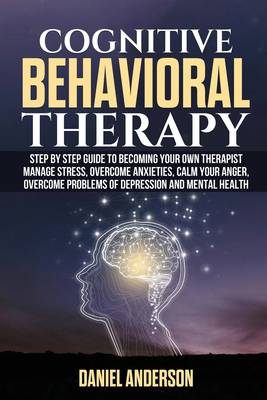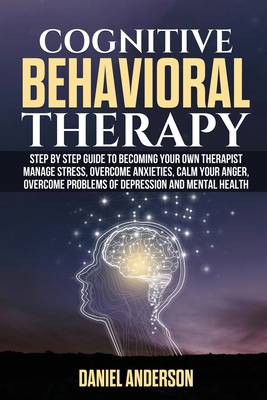
- Afhalen na 1 uur in een winkel met voorraad
- Gratis thuislevering in België vanaf € 30
- Ruim aanbod met 7 miljoen producten
- Afhalen na 1 uur in een winkel met voorraad
- Gratis thuislevering in België vanaf € 30
- Ruim aanbod met 7 miljoen producten
Zoeken
Cognitive Behavioral Therapy
Step by Step Guide to Becoming Your Own Therapist Manage Stress, Overcome Anxieties, Calm Your Anger, Overcome Problems of Depression and Mental Health
Daniel Anderson
Paperback | Engels
€ 23,95
+ 47 punten
Omschrijving
Cognitive behavioral therapy (CBT) is one of the common forms of therapy today that helps you address your problems from the perspective of your behaviors and thoughts. CBT has been used in the past to help in treating depression and anxiety, but it has also shown promise in managing other psychological health concerns. CBT is about positivity. Through the therapy sessions, you will learn to appreciate yourself and your life as it is. You learn how to recognize the foundation of your challenges, and what makes them stronger. One of the reasons why CBT comes highly recommended is because the lessons you learn will go a long way, and you can use them in many aspects of your life. Our thoughts, feelings, and emotions determine who we become or what we do about our interactions. More often, negative thoughts trap us in a cycle that we cannot get out of. This becomes a problem for many people because you end up pushing yourself away from social interactions. You find solace in isolation, and before long, you withdraw from activities that would normally give you joy and satisfaction. In CBT therapy sessions you dig deeper into the cycle of emotions that overwhelm you. You learn how they start, what makes them stronger, and the effect they have on your life. Recognizing the problem is an important step on your way to recovery. It takes away the element of denial and helps you embrace change. It is impossible to change something that you do not understand. This is why your therapist will first try to help you understand what you are going through and identify the important signs in your life. Most of the challenges that hold you back and affect your interpersonal, social, or professional interactions stem from innate psychological disorders that you might experience without knowing about it. Today a lot of people put on a brave face to get through interactions, hoping that they can end as fast as possible for them to run away and retreat to their safe zone at home. These are behaviors that soon spiral out of control, and before long you struggle to interact with people at all. The challenge is that this will interfere with your relationships, to the point where you no longer believe in yourself or see yourself as worthy of attention. As you begin your journey into recovery through CBT, you must keep an open mind. Remember that CBT is about collective support from you and your therapist. You work with the therapist to identify the deep-rooted causes, but you must show commitment towards transforming. Things might get rough along the way. You might relapse at some point, but never lose sight of your goals. In this book, you will learn more about:
- Cognitive Behavioral Therapy Start Guide - Setting Goals- Cognitive Behavioral Therapy Principles- How And Why Cognitive Behavioral Therapy Work - Identifying the Underlying Problem - Cognitive Behavioral Therapy Help Yourself - Cognitive Behavioral Therapy Anxiety And Depression - How to Use Behavioral Activation to Overcome Anxiety and Depression - Cognitive Behavioral Therapy Panic And Worry- Cognitive Behavioral Therapy Stress And Anger- Maintain Mindfulness- Modify Your Attitude.- CBT in Practice - ... AND MORE!
- Cognitive Behavioral Therapy Start Guide - Setting Goals- Cognitive Behavioral Therapy Principles- How And Why Cognitive Behavioral Therapy Work - Identifying the Underlying Problem - Cognitive Behavioral Therapy Help Yourself - Cognitive Behavioral Therapy Anxiety And Depression - How to Use Behavioral Activation to Overcome Anxiety and Depression - Cognitive Behavioral Therapy Panic And Worry- Cognitive Behavioral Therapy Stress And Anger- Maintain Mindfulness- Modify Your Attitude.- CBT in Practice - ... AND MORE!
Specificaties
Betrokkenen
- Auteur(s):
- Uitgeverij:
Inhoud
- Aantal bladzijden:
- 140
- Taal:
- Engels
Eigenschappen
- Productcode (EAN):
- 9781801475037
- Verschijningsdatum:
- 13/12/2020
- Uitvoering:
- Paperback
- Formaat:
- Trade paperback (VS)
- Afmetingen:
- 152 mm x 229 mm
- Gewicht:
- 195 g

Alleen bij Standaard Boekhandel
+ 47 punten op je klantenkaart van Standaard Boekhandel
Beoordelingen
We publiceren alleen reviews die voldoen aan de voorwaarden voor reviews. Bekijk onze voorwaarden voor reviews.











